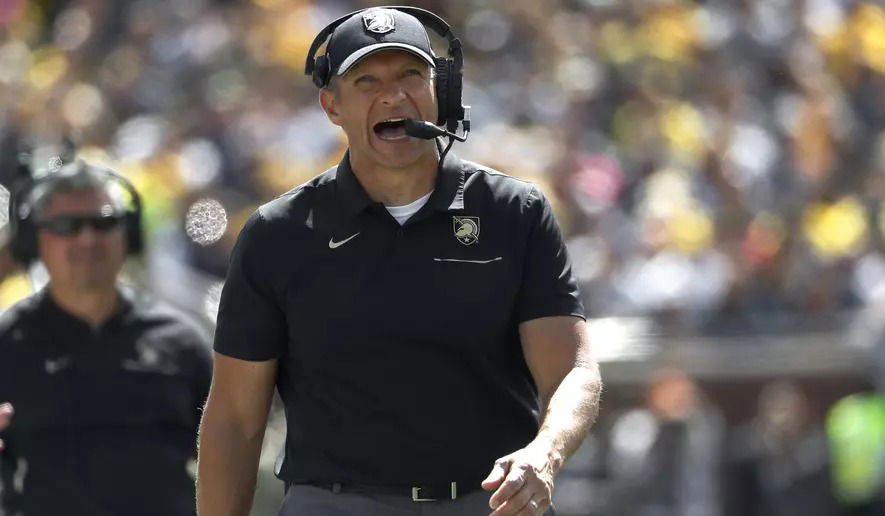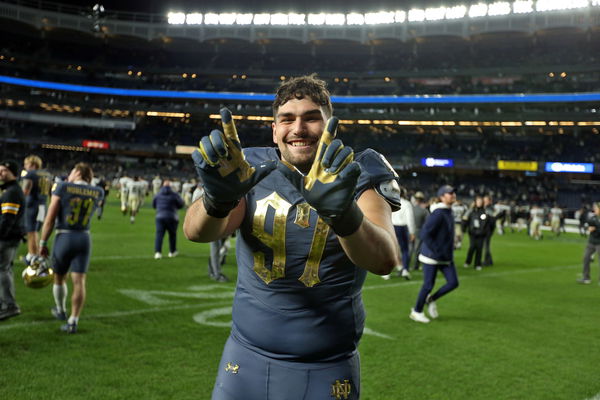

On 23rd November last year, the Army Black Knights, led by Jeff Monken in his 11th season as a head coach, entered Yankee Stadium to face Notre Dame. It was Army’s first season in the AAC, and they were coming undefeated in that game. So, naturally, expectations were high for them, but Army against Notre Dame? It was a game whose result everyone expected already. And even before the Army team stepped on that field, Jeff Monken knew it was hard to compete with the ‘mighty’ Fighting Irish, with endless resources at their disposal.
Watch What’s Trending Now!
“We’re not void of talent. We’ve got some talented guys on our team. But are we the most talented team on the field on Saturday? Probably never,” said Jeff Monken ahead of that Notre Dame game. The result was probably even out of Monken’s control. The team lost 14-49 against the Irish. Worse? QB Bryson Daily managed to garner just 26 passing yards. However, the defeat was more than just a defeat on the field; it signified a shift in the times. It was a premonition that to compete against richer programs, you should be willing to throw $20-40 million to build your squads.
ADVERTISEMENT
Aside from that Notre Dame game, the Army Black Knights were a great story in the AAC, finishing with an impressive 12 wins. But when you stack them up against teams like Notre Dame, they’re still a bit of an underdog. For some context, last year, their recruiting class was ranked 130th in the nation, while Notre Dame pulled in a much stronger class at 11th. That’s one reason why Monken seems a bit uneasy in a recent interview about the changes happening in college football.
Monken appeared on the 3rd July podcast episode of ‘Next Up with Adam Breneman’ and talked about the challenges that teams like Army face in the new landscape of college football. One of those issues, he says, is the transfer portal. “A guy could play five years of college football and be at nine different schools in the current state of affairs. I don’t think that’s healthy because I don’t think that’s good for athletes,” said Jeff Monken.
ADVERTISEMENT
Monken felt skeptical about the latest changes that NIL and the revenue opportunities are bringing to college athletics. So, for him, the opportunities might be lucrative for athletes, but amidst that, he says that the athletes are losing a crucial aspect of the sport for which it was formed in the first place.
ADVERTISEMENT
“My fear is that what’s happening is that the opportunities for these athletes are going to decrease. There might be more scholarships. Yeah. But fewer opportunities for people to play and participate. And what athletics does is teach life skills, leadership, overcoming adversity, being a part of a team, appreciation, and love for something bigger than myself. There are lessons being taught on ball fields and on courts that can’t be taught in any other place. And I don’t want to lose that,” said Monken. To be honest, Monken’s fear is real and something that other prominent people, including Nick Saban, have also raised.

Imago
Nov 23, 2024; New York, New York, USA; Notre Dame Fighting Irish defensive lineman Gabriel Rubio (97) celebrates after a win against the Army Black Knights at Yankee Stadium. Mandatory Credit: Danny Wild-Imagn Images
With the advent of NIL opportunities and the revenue-sharing agreement, college football has become more of a pay-for-play sport. This essentially takes one crucial aspect out, and that is competitive imbalance and team equity. We already have big programs focusing less on other sports like Athletics and Baseball due to the revenue sharing and sustainability issues, and if this persists, then we could see just three or four sports dominating college athletics in the future. Moreover, for Army and Jeff Monken, the consequences are multifold.
ADVERTISEMENT
Jeff Monken explains why he refused to be part of the House v NCAA settlement
For Monken, NIL isn’t the only issue, and the issues now are intensified after the House v. NCAA settlement has passed. The settlement, in principle, allows teams to share up to $20.5 million of the revenue they generate and also puts in some safeguards to regulate NIL deals. Still, for the Army, the promise of that $20.5 million is just a mirage far away in the desert.
ADVERTISEMENT
“Will anything change for Army with revenue sharing coming in the new house settlement, $20.5 million a year, schools can pay their athletes?” Adam Breneman asked Monken. And Monken, without any hesitation, said, “It will not,” and went on to explain why they have opted out of the settlement.
“Our cadets here, when they make a commitment here, they are committed to becoming army officers, and they can’t have jobs doing other things. Which I think is what every American citizen can be sure of is that our young men and women who come here are committed to one thing. And that’s serving their nation with distinction and honor,” said Monken.
ADVERTISEMENT
Of course, the main purpose of the United States Military Academy at West Point is to build soldiers and prepare them for serving the nation. So, money, in that sense, becomes your least worry when you are there to serve your nation. So, while Notre Dame and other big programs can enjoy their revenue-sharing money, the Black Knights can’t afford the restrictions that come with the settlement, as Monken pointed out.
“So with the house settlement comes a lot of restrictions, too. And so if, in fact, we could be a part of the house settlement and revenue share, then those restrictions would be on us.” Despite opting out, their resilience is unmatched, and the team is dominating the AAC in just their first season, which alone speaks of the job that Monken is doing with quite limited resources.
ADVERTISEMENT
ADVERTISEMENT
ADVERTISEMENT
.png)
.png)
.png)



